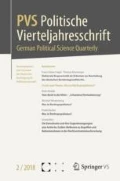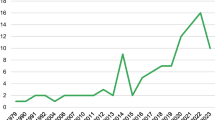Abstract
In this essay I present three challenges to the view that democratic self-determination justifies immigration control. I propose, first, that the reason democratic states can claim immigration control powers is not that they are democratic, but that they are independent states. Exercising this power is legitimate when immigration control is needed to preserve the conditions for democratic self-government. Second, I argue that democratic norms provide positive reasons for promoting free international movement and admission claims for family migrants, labour migrants, and refugees. Third, I suggest that current disputes over immigration policy in the European Union reflect deeper conflicts between open and closed conceptions of democracy. If this is correct, then choosing closure over openness may put the future of democracy itself at risk and should thus not be regarded as an issue of democratic self-determination.
Zusammenfassung
Dieser Text kritisiert die weitverbreitete Ansicht, dass ein demokratisches Recht auf Selbstbestimmung Einwanderungskontrolle rechtfertigt. Erstens schlage ich vor, dass der Grund, warum demokratische Staaten grundsätzlich zur Einwanderungskontrolle ermächtigt sind, nicht darin besteht, dass sie demokratisch sind, sondern dass sie unabhängige Staaten sind. Die Ausübung dieser Befugnisse ist nur insofern legitim, als Einwanderungskontrolle erforderlich ist, um die Bedingungen für demokratische Selbstregierung zu bewahren. Zweitens argumentiere ich, dass demokratische Normen positive Gründe für die Förderung der Freizügigkeit und für Aufnahmeansprüche von Familienmigranten, Arbeitsmigranten und Flüchtlingen liefern. Drittens schlage ich vor, dass der gegenwärtige Dissens über die Einwanderungspolitik in der Europäischen Union tiefere Konflikte zwischen offenen und geschlossenen Vorstellungen von Demokratie widerspiegelt. Wenn dies zutrifft, dann kann die Entscheidung für Schließung die Zukunft der Demokratie selbst gefährden und sollte daher nicht als Frage der demokratischen Selbstbestimmung betrachtet werden.
Similar content being viewed by others
Notes
Only a few authors defend the right of states to full closure. Christopher Heath Wellman does so on grounds of an analogy between states and voluntary associations (Wellman 2008).
For Joseph Carens, the most influential theorist in this debate, the relevant tension is instead between an ideal theory argument for open borders and a realist argument for immigrant rights under nonideal conditions where states control immigration (Carens 2013).
Among the several competing versions of realism in normative political theory, I would generally endorse the “real-world justice” approach that Macdonald and Little summarise as a problem-centred methodological strategy, a focus on the political value of legitimacy, and a normative and critical commitment (Little and Macdonald 2015).
The number of EU citizens who have made use of their free-movement rights is roughly 11% compared with only 3% of current free movers in the EU population (Recchi et al. 2019).
We are concerned here with immigration across political borders, not with physical movement in space, which is regulated and restricted in many ways, e.g. through traffic and private property laws. National governments may even fully prohibit access to and settlement in certain parts of the territory, such as national parks, but these are administrative rather than political territories. There are also exceptional restrictions of internal free movement in the proper sense of the term in some democratic states, e.g. for settlement in indigenous territories in North America. These can be justified on grounds of special protection needs and indigenous claims to semi-sovereign forms of self-government.
Political theories hardly ever refer to the European Union when discussing free movement and its preconditions, which shows a disturbing lack of attention to real-world contexts.
See ICCPR Art. 12(4).
There is a relatively broad consensus on this point among political theorists who otherwise strongly disagree on the legitimacy of immigration control. See e.g. Abizadeh (2008) and Miller (2016, p. 37). As Andrea Sangiovanni has suggested to me, a duty to justification can coexist with a legitimate power to decide. My specific point here is that democratic legitimacy requires justifying the exercise of this power in democratic terms—or refraining from exercising it where no such justification can be provided.
Elsewhere I claim that the same principle that the exercise of self-determination is legitimate only if necessary to realise a legitimate claim to self-government applies also to secession of a territory from an independent state (Bauböck 2019b).
An argument along these lines was suggested early on by Bruce Ackerman (1980, p. 87–95).
David Miller defends a right of states to determine their overall immigration intake (Miller 2016, p. 160) but suggests that within such a quota they need to give priority to refugees (ibid.: 164). However, admitting economic migrants may actually enhance a state’s capacity to also admit refugees if it contributes to economic growth and greater acceptance of diversity (Bauböck 2019a). Instead of setting overall immigration quota, democracies should determine flexible targets and limits for each category of immigrants that is subject to immigration control.
Caleb Yong is among the few authors who distinguish “strong rights to immigrate for specifically protected reasons and a weak right to immigrate that establishes a presumption against immigration restrictions that lack a sufficient justification” (Yong 2017).
Unlike the right to emigrate and to internal free movement, the right to return to one’s country is not further qualified by public order clauses (ICCPR 1966, Art. 12(4)). States can, however, circumvent it if they can strip nationals of their citizenship, which they can do more easily with dual nationals.
See the Nottebohm judgment of the International Court of Justice (Liechtenstein v. Guatemala [1955] ICJ 1).
Thirty-eight percent of all residence permits issued for third-country nationals in 2015 were for purposes of family reunification (European Migration Network 2016).
For lack of space, I cannot distinguish here between temporary labour migration and economically motivated permanent immigration.
See de Haas (2010) for a critical overview of the debate on migration and development. De Haas emphasises that positive impacts of migration on development depend strongly on public policies and institutions in countries of origin.
References
Abizadeh, Arash. 2008. Democratic theory and border coercion: no right to unilaterally control your own borders. Political Theory 36(1):37–65.
Ackerman, Bruce. 1980. Social justice in a liberal state. New Haven: Yale University Press.
Acosta Arcarazo, Diego. 2018. The national versus the foreigner in South America. 200 years of migration and citizenship law. Cambridge: Cambridge University Press.
Angeli, Oliviero. 2018. Migration und Demokratie. Ein Spannungsverhältnis. Ditzingen: Reclam.
Bader, Veit M. 1997. Fairly open borders. In Citizenship and exclusion, ed. Veit M. Bader, 28–61. London: Macmillan.
Bauböck, Rainer. 2009. Global justice, freedom of movement and democratic citizenship. European Journal of Sociology/Archives européennes de sociologie 50(1):1–31.
Bauböck, Rainer. 2017. Democratic inclusion. Rainer Bauböck in dialogue. Critical powers. Manchester: Manchester University Press.
Bauböck, Rainer. 2018. Refugee protection and burden-sharing in the European Union. Journal of Common Market Studies 56(1):141–156. https://doi.org/10.1111/jcms.12638.
Bauböck, Rainer. 2019a. Mare nostrum: the political ethics of migration in the mediterranean. Comparative Migration Studies. https://doi.org/10.1186/s40878-019-0116-8.
Bauböck, Rainer. 2019b. A multilevel theory of democratic secession. Ethnopolitics 18(3):227–246.
Benhabib, Seyla. 2004. The rights of others. Cambridge: Cambridge University Press.
Benhabib, Seyla. 2006. Another cosmopolitanism. With Jeremy Waldron, Bonnie Honig, and Will Kymlicka, ed. Robert Post. Oxford: Oxford University Press.
Carens, Joseph H. 2013. The ethics of immigration. Oxford: Oxford University Press.
Cassee, Andreas. 2016. Globale Bewegungsfreiheit. Ein philosophisches Plädoyer für offene Grenzen. Berlin: Suhrkamp.
European Migration Network. 2016. Family reunification of third-country nationals in the EU plus Norway: national practices. In Migrapol EMN [Doc 382]. Brussels.
Ferrera, Maurizio. 2018. EU citizenship needs a stronger social dimension and soft duties. In Debating European citizenship, ed. Rainer Bauböck, 181–198. Cham: Springer.
Frazer, Michael. 2016. Utopophobia as a vocation: the professional ethics of ideal and nonideal political theory. Social Philosophy and Policy 33(1–2):175–192.
Freeman, Gary. 1995. Modes of immigration politics in liberal democratic states. International Migration Review 29(4):881–902.
Galston, William. 2010. Realism in political theory. European Journal of Political Theory 9(4):385–411.
Geddes, Andrew, Marcia Vera-Espinoza, Leila Hadj-Abdou, and Leiza Brumat (eds.). 2019. The dynamics of regional migration governance. Aldershot: Edward Elgar.
Goodhart, David. 2017. The road to somewhere. The new tribes shaping British politics. London: Penguin Books.
de Haas, Hein. 2010. Migration and development: a theoretical perspective. International Migration Review 44(1):227–264.
Hampshire, James. 2013. The politics of immigration. London: Polity Press.
Hollifield, James. 2004. The emerging migration state. International Migration Review 38(3):885–912.
ICCPR. 1966. International covenant on civil and political rights. United Nations.
Joppke, Christian. 1999. Immigration and the Nation-State: The United States, Germany, and Great Britain. London: Routledge.
Kostakopoulou, Dora. 2008. The future governance of citizenship. Cambridge: Cambridge University Press.
Kriesi, Hanspeter, Edgar Grande, Romain Lachat, Martin Dolezal, Simon Bornschier, and Timotheos Frey. 2008. West European politics in the age of globalization. Cambridge: Cambridge University Press.
Lenard, Patti Tamara. 2015. Residence and the right to vote. Journal of International Migration and Integration 16(1):119–132.
Little, Adrian, and Terry Macdonald. 2015. Introduction to special issue: real-world justice and international migration. European Journal of Political Theory 14(4):381–390.
Lutz, Wolfgang. 2012. Demographic metabolism: a predictive theory of socioeconomic change. Population and Development Review 38(4):283–301.
Miller, David. 1995. On nationality. Oxford: Oxford University Press.
Miller, David. 2010. Why immigration controls are not coercive: a reply to Arash Abizadeh. Political Theory 38(1):111–120.
Miller, David. 2013. Justice for earthlings. Cambridge: Cambridge University Press.
Miller, David. 2016. Strangers in our midst. The political philosophy of immigration. Cambridge: Harvard University Press.
Oberman, Kieran. 2016. Immigration as a human right. In Migration in political theory, ed. Sarah Fine, Lea Ypi, 32–56. Oxford: Oxford University Press.
Owen, David. 2016. In loco civitatis: on the normative basis of the institution of refugeehood and responsibility for refugees. In Migration in political theory, ed. Sarah Fine, Lea Ypi, 269–289. Oxford: Oxford University Press.
Prak, Maarten. 2018. Citizens without nations. Urban citizenship in Europe and the world, c. 1000–1789. Cambridge: Cambridge University Press.
Recchi, Ettore, Adrian Favell, Fulya Apaydin, Roxana Barbulescu, Michael Braun, Irina Ciornei, Niall Cunningham, Juan Díez Medrano, Deniz N. Duru, Laurie Hanquinet, Steffen Pötzschke, David Reimer, Mike Salamońska, Mike Savage, Janne Solgaard Jensen, and Albert Varela. 2019. Everyday Europe. Social transnationalism in an unsettled continent. Bristol: Policy Press.
Rossi, Enzo, and Matt Sleat. 2014. Realism in normative political theory. Philosophy Compass 14(9/10):689–701.
Song, Sarah. 2019. Immigration and democracy. Oxford: Oxford University Press.
Spiro, Peter J. 2016. At home in two countries. The past and future of dual citizenship. New York: NYU Press.
Torpey, John. 2000. The invention of the passport: surveillance, citizenship, and the state. Cambridge: Cambridge University Press.
Vink, Maarten, Arjan H. Schakel, David Reichely, Ngo Chun Luk, and Gerard-Rene de Groot. 2019. The international diffusion of expatriate dual citizenship. Migration Studies 7(3):362–383. https://doi.org/10.1093/migration/mnz011.
van der Vossen, Bas. 2015. Immigration and self-determination. Politics, Philosophy, and Economics 14(3):270–290.
Walzer, Michael. 1983. Spheres of justice. A defense of pluralism and equality. New York: Basic Books.
Wellman, Christopher H. 2008. Immigration and freedom of association. Ethics 119(1):109–141.
Williams, Bernard. 2005. In the beginning was the deed. Realism and moralism in political argument. Princeton: Princeton University Press.
Yong, Caleb. 2017. Immigration rights and the justification of immigration restrictions. Journal of Social Philosophy 48(4):461–480.
Zolberg, Aristide. 2007. The exit revolution. In Citizenship and those who leave. The politics of emigration and expatriation, ed. Nancy L. Green, François Weil, 33–60. Urbana, Chicago: University of Illinois Press.
Acknowledgements
Thanks to Mattias Kumm, Klaus Detterbeck, Anja Jetschke, Rainer Forst, and Andrew Geddes for hosting presentations of draft versions of this paper and to the participants at Humboldt University Berlin, University of Göttingen, Goethe University Frankfurt, and the European University Institute in Florence for useful feedback. Special thanks to David Abraham, Chiara Destri, Andrea Sangiovanni, and two anonymous reviewers for very helpful written comments.
Author information
Authors and Affiliations
Corresponding author
Rights and permissions
About this article
Cite this article
Bauböck, R. The Democratic Case for Immigration. Polit Vierteljahresschr 61, 357–375 (2020). https://doi.org/10.1007/s11615-020-00229-3
Received:
Revised:
Accepted:
Published:
Issue Date:
DOI: https://doi.org/10.1007/s11615-020-00229-3
Keywords
- Democratic norms
- Immigration control
- Self-determination
- Self-government
- Free movement
- Labour migration
- Refugees
- European Union




